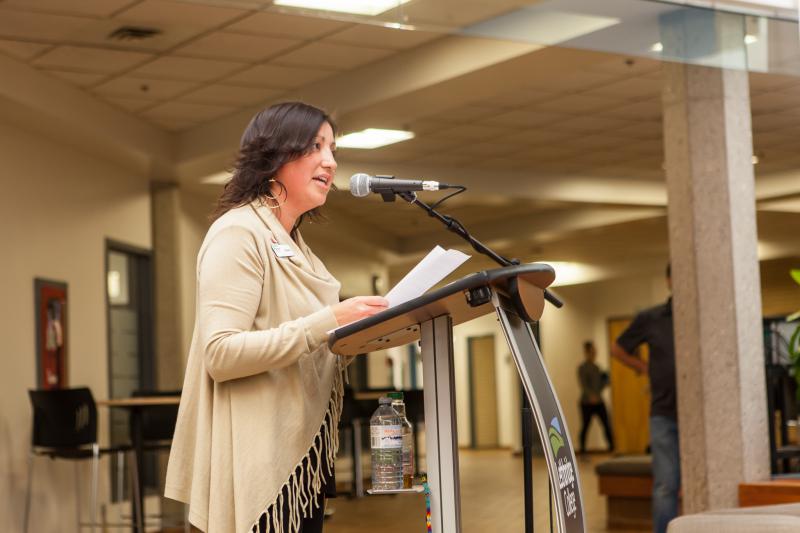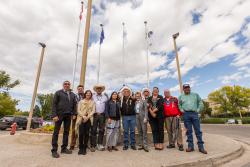 Acknowledging and celebrating its location on the traditional land of the Blackfoot people, Lethbridge College is proud to permanently fly the Blackfoot Confederacy flag in front of its campus. The flag was unveiled during a traditional ceremony on Tuesday afternoon.
Acknowledging and celebrating its location on the traditional land of the Blackfoot people, Lethbridge College is proud to permanently fly the Blackfoot Confederacy flag in front of its campus. The flag was unveiled during a traditional ceremony on Tuesday afternoon.
“It is important to have symbols of what we believe in here at Lethbridge College, and prominently flying the Blackfoot Confederacy flag is a strong visual representation of our values,” says Dr. Paula Burns, Lethbridge College President and CEO. “One of our over-arching institutional goals is to focus on Indigenous perspectives and education and this is another step towards that commitment.”
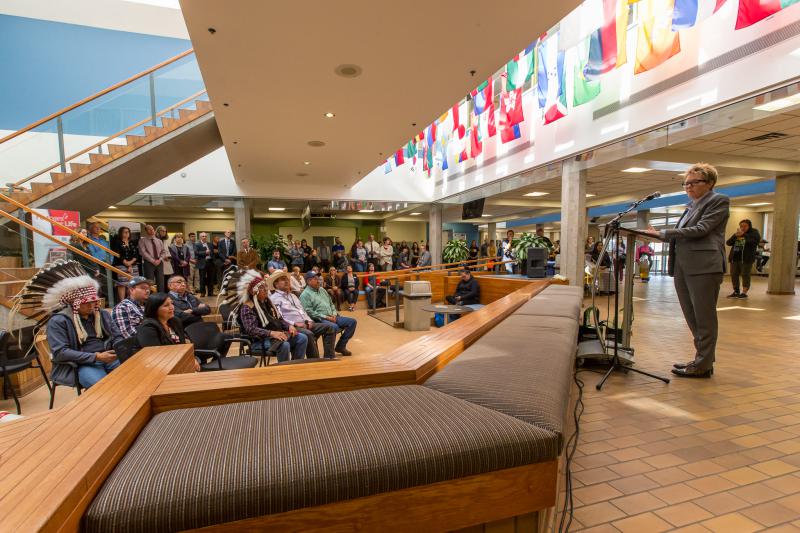
The flag will serve as a symbolic representation of the college’s commitment to ensuring that its students’ learning journey includes knowledge of the Blackfoot people and the resiliency that continues in generations today. Guided by its Blackfoot Kaahsinnooniiksi (Grandparents) and community members, it is the college’s goal to collaborate respectfully to a greater knowledge and understanding of the Blackfoot ways.
“We would like to do our part with reconciliation efforts,” says Shanda Webber, Lethbridge College manager of Recruitment and Indigenous Services. “This can be done first by learning from our host Indigenous communities, and further by having a goal to improve the education experience here at Lethbridge College for all of our Indigenous students. The raising of the Blackfoot Confederacy flag permanently on our campus grounds is one piece to moving forward together.”
Lethbridge College is believed to be the first post-secondary institution to permanently fly the Blackfoot Confederacy flag. Through the symbol of the tipi ring, the flag honours all three Alberta Blackfoot Nations: Blood Tribe/Kainai; Siksika; and Piikani; as well as Montana’s Blackfeet Nation. Found throughout Blackfoot territory, tipi rings uphold the knowing that the Blackfoot people lived on these lands for many years before contact.
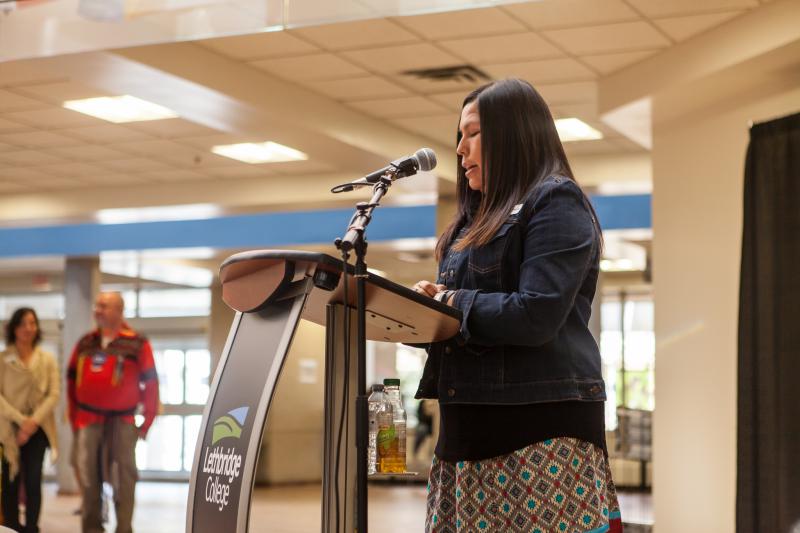
“As a member of the Blood Tribe community and Lethbridge College family, the raising of the flag will hold pride, honour and be a reminder that while our Blackfoot grandparents and parents endured a past we cannot even imagine through residential schooling, today’s generations are able to choose any education path they want,” says Marcia Black Water, Lethbridge College Indigenous Services coordinator. “It is my hope that in choosing Lethbridge College to get an education or to educate, that all Indigenous and non-Indigenous people come to learn what it means when they hear, ‘we are on traditional Blackfoot territory,’ and that they will embrace the gift of knowledge that includes a piece of Blackfoot ways of knowing.”
Lethbridge College’s efforts towards serving Indigenous students both in and out of the classroom earned it a bronze Indigenous Education Excellence award in May from Colleges and Institutes Canada (CICan). The college has proudly had Indigenous students on campus for most of its 60 years and provides a “Circle of Services” to assist Indigenous learners.
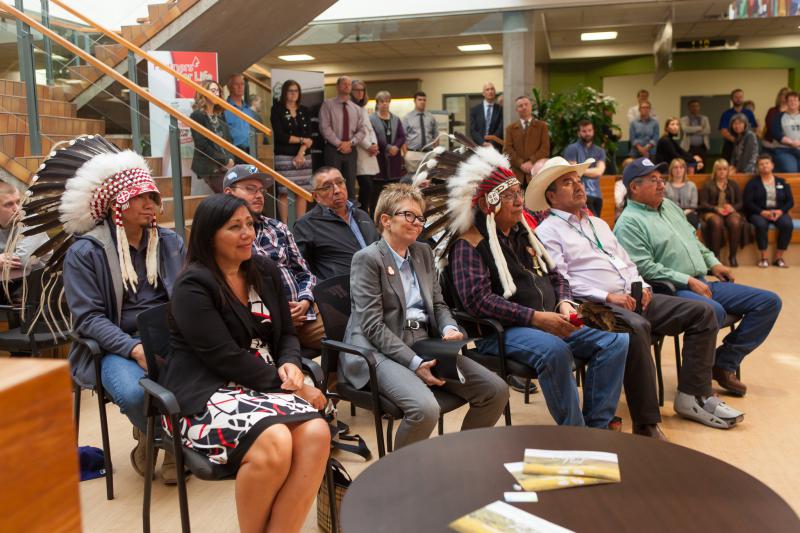
Indigenous Services at Lethbridge College, in collaboration with many internal and external stakeholders, developed a three-year Niitsitapi Indigenization Plan for 2016-19. In addition, in recognition of the recommendations emanating from the Truth and Reconciliation Commission of Canada and as a signatory of CICan’s Indigenous Education Protocol, the college has also implemented an Indigenous President’s Council. This council is composed of college and Indigenous community leaders and provides guidance and direction to an internal Indigenous committee as it works to implement a three-year Indigenization Plan, which will further enhance its already extensive program and service offerings.
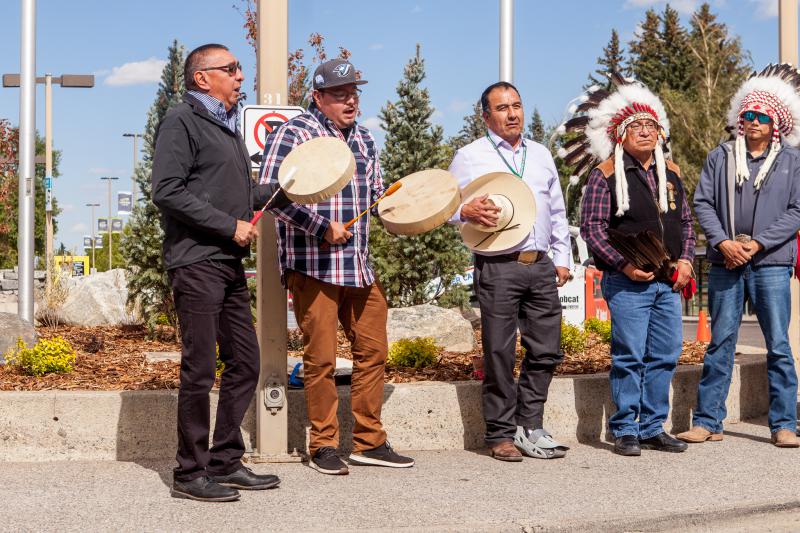
The Blackfoot Confederacy flag is now visible outside of Lethbridge College’s main entrance, accessible off of College Drive S.
